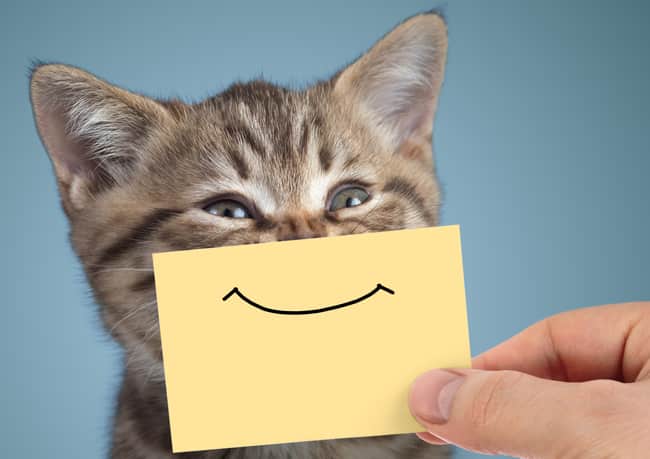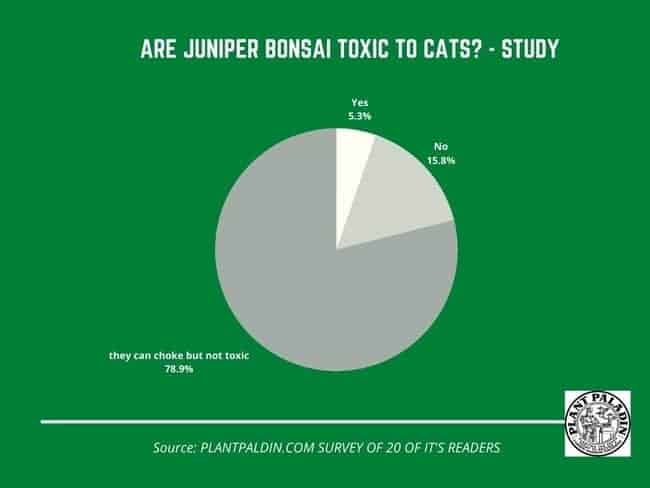This website is supported by its readers. If you click one of my links I may earn a commission. I am also a participant in the Amazon affiliates program and I will also earn a commission from qualified purchases.

So recently I moved into a new home. One of the things I’ve noticed is the number of cats in the area, with both of my neighbours owning feline friends. As I have a few juniper bonsai in my collection, this got me thinking, are juniper bonsai toxic to cats?
Juniper bonsai trees are not toxic or poisonous to cats or any cat breed, making them the ideal bonsai trees to keep should you keep cats as pets. Care should be taken, however, to prevent cats from eating the needle/tips of juniper, which cats can choke on.
So why are juniper bonsai not toxic to cats? And what should you do if your cat eats a juniper? Keep reading to find out more!
Just a quick heads up, over the past three years of running Plantpaladin, hundreds of people have asked for product recommendations. As such, You can find my favorite indoor bonsai tree here (link takes you to Bonsaiboy), my favorite outdoor bonsai tree (link takes you to Bonsaiboy), or have a look at all the products I recommend here.
Are Juniper bonsai toxic to cats?
It’s estimated that there are around 95.6 million cats owned in the USA alone.
Pair this up with the fact that keeping bonsai trees as a hobby is increasing by around 4% year on year, which gives a lot of potential crossover between bonsai trees and cat owners.
With juniper bonsai, easily being one of the most popular bonsai tree species on the marketplace, it’s important to know as a cat owner if juniper bonsai is poisonous to cats.
As such, I got in touch with the ASPCA and did a quick survey of plant paladin readers, and even spoke to a rep from my local vet to get to the bottom of the answer.
To summarise:
- Juniper bonsai is not toxic or poisonous to cats.
- The ASPCA does not list juniper species on their list of toxic plants to cats.
- That being said, as cats are carnivorous animals, needing taurine that is found only in meat and dairy – they do not do well on either vegan or vegetarian diets.
- Should your cat eat juniper trees then, this might invoke some marginal gastrointestinal discomfort due to their digestive system not handling the lack of taurine required in juniper plants
- Care should be taken however should your cat eat the needle/tip like leaves of a juniper tree.
- These leaves can easily get caught in the throat of your cat potentially causing them to choke.
- Other evergreen coniferous species however such as certain pine species are incredibly toxic and should be kept away from cats at all costs.
What happens if your cat eats a juniper?
Should your cat eat a juniper bonsai, you should be vigilant and ensure your cat does not choke on the needle/tip like leaves. Whilst Junipers are not toxic or poisonous to cats, the small needles like leaves can easily get stuck in their throats.
How to stop your cat from choking?
If you are in the unfortunate position where your cat is choking on the juniper leaves then there are a few things you can to do immediately prevent this:
- Undertaking a mouth sweep
- Using the cat Heimlich
Let’s explore these in more detail:
Mouth sweep
The mouth sweep method is easily the most common method recommended to use on cats if they are choking.
To undertake the mouth sweep, start by opening your cat’s jaws carefully.
Then sweep your cat’s mouth with your index finger to look for the juniper leaves. If you see them swipe them out of the mouth of your cat
If you can’t see it, the leaves might be near the back of your cat’s throat and the below technique should be used.
Cat Heimlich
The cat Heimlich is used in more serious cases when you cannot manually remove the juniper leaves by hand.
To use, hold your cat with your cat’s back against your chest and its bottom feet dangling.
Then push up against the belly of your cat with 4 to6 firm pushes upwards – that should dislodge the leaf from your cat.
This can be complex if you have never done this before so hopefully, the video below should help:
It’s worth noting that once you have successfully stopped the choking, it would be a good idea to get your cat to the vet in case there are any lingering issues.
What happens if your cat has an upset stomach from eating a juniper bonsai?
As mentioned earlier, due to cats being carnivorous animals, eating any kind of greenery, regardless of whether it is toxic or not can cause some gastrointestinal discomfort for your cat.
If your cat then, has eaten a juniper and it has an upset stomach, ensure you do the following:
- Give your cat plenty of fluids – this will prevent your cat from dehydrating when it throws up.
- Reduce the amount of fibre your cat is consuming
- Invest it in anti-diarrhoea medications such as cat safe Kaolin-pectin medication.
- Massage your cat’s stomach – excess gas might have built up and rubbing your cat’s stomach can help prevent this.
- If the diarrhoea or stomach discomfort persists, then make sure you contact your Vet.
How to prevent cats from eating juniper
Now whilst Juniper bonsai might not be toxic/poisonous to cats, you might still want to prevent your cat from eating or attacking your tree.
Failing to do so will mean your cat can potentially damage your tree and cause you to fall years behind in the training process of your juniper tree.
To prevent your cat from eating your juniper then:
- Prevent your cat from going outside
- Check for pests
- Make your juniper inaccessible
- Give your cat their own plant
- Train your cat
Let’s explore these all briefly
Prevent your cat from going outside
Easily the most dramatic way to prevent your cat from eating your bonsai is to simply keep your cat indoors. Some cats breeds are very domesticated and seldom want to explore their outdoor environment. As juniper bonsai are typically kept outdoors, preventing your cat from exploring your garden can be a surefire way to prevent cats from eating your tree.
This method is the most extreme however and might not work for all tree species… or cats for that matter!
Check for pests
Bonsai trees have a habit of attracting pests such as aphids, scale, spider mites and caterpillars.
That’s being said other pests such as foxes, squirrels, birds and most importantly mice and rats too are known to sometimes attack trees.
Should these pests find themselves near your bonsai then there is a good chance your cat will start to damage your tree in the process as it hunts for these trees.
It’s important to stay on top of pest control in your juniper.
Make your juniper inaccessible
Now if you can’t keep your cat indoors then the next best thing is to make your juniper bonsai inaccessible from your cat.
Keeping your juniper bonsai tree in a greenhouse or surrounding your juniper in a cage that your cat cannot attack will be the best method.
Just keep in mind that cats are excellent climbers so even if you think you have put your juniper bonsai out of harm’s way, you need to make sure that your tree is adequately covered.
Give your cat their own plant
Part of the reason cats might attack or play with your juniper is that they are a little jealous and want their own greenery to play with.
This can be especially apparent should you keep your Juniper bonsai in an apartment or on a balcony.
If this is the case and you don’t have much foliage for your cat then consider getting your cat its own green patch or plant to play with.
Just ensure you choose a species that is not harmful to your cat.
Train your cat
As much as cats would never like to admit any similarity to dogs, cats too can be well trained.
Using things like traits to reinforce good behaviour or taking your cat to a specialist cat trainer can prevent any unwanted incidents involving your juniper bonsai.
Are juniper bonsai toxic to cats? – Study
Finally, I undertook a quick survey of plant paladin readers on if juniper bonsai are toxic to cats.
Here were the results:

Now if you are in the process of growing bonsai, I would definitely recommend having a look at the following posts:
- How to wire a bonsai
- How long do bonsai trees take to grow
- Juniper bonsai tree training guide
- Juniper bonsai temperature range
- Bonsai driftwood for an aquarium
My top picks for the gear you will need!
So like I mentioned earlier, over the past three years of running PlantPaladin, hundreds of people have asked me for my recommendations on the best bonsai gear on the market.
Having spent thousands of dollars on bonsai items these past few years and tested at least 100 bonsai-specific products, I’ve listed my favorite products below – All of which I highly recommend and think you can get great value.
They can purchase directly by clicking the link to take them to Amazon.
Bonsai Tool Set: One of the significant challenges I’ve had is finding a toolset that was not only durable but didn’t break the bank. SOLIGT has recently developed a fantastic bonsai tool set that covers all the tools you need to trim, prune, and repot your trees. – You can grab it here.
Complete Bonsai Set: Many of you will want to grow your bonsai trees entirely from scratch, but finding the varicose seeds, pots, and other items in one place can be challenging. Leaves and Sole then have created a complete bonsai set that I’ve personally used that ticks all the boxes. You can grab it here.
Bonsai wire: The number of times I’ve run out of wire for my bonsai or purchased cheap bonsai wire that doesn’t do the job is embarrassing for me to admit. After a lot of trial and error, I found that using Hotop’s aluminum bonsai wire is one of the best options on the market. This can easily be used for both indoor and outdoor bonsai. You can grab it here.
This post was written by Fehed Nicass who has been passionate about bonsai for over 3 years

